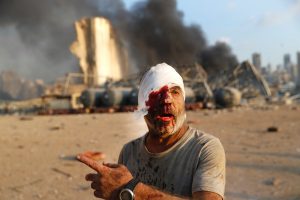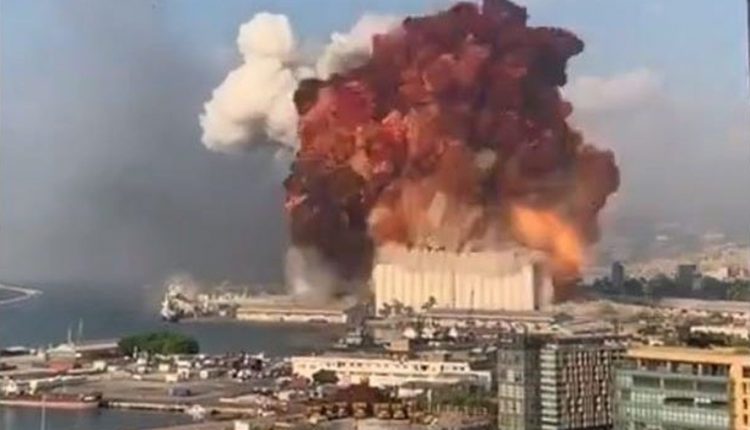Beirut explosion kills at least 80, injures thousands
US officials dispute Trump's claim it was an "attack"
BEIRUT — A massive explosion rocked Beirut, Lebanon, on Tuesday, flattening much of the city’s port, damaging buildings across the capital and sending a giant mushroom cloud into the sky.
CNN reported the body count thus far is 80 people killed and 4,000 injured, with bodies buried in the rubble.
The blast struck with the force of a 3.5 magnitude earthquake, according to Germany’s geosciences center GFZ, and it was heard and felt as far away as Cyprus more than 200 kilometers (180 miles) across the Mediterranean.
The sudden devastation overwhelmed a country already struggling with both the coronavirus pandemic and an economic crisis.
For hours afterward, ambulances rushing in from around Lebanon carried away the wounded. Hospitals quickly filled beyond capacity, pleading for blood supplies, and generators to keep their lights on.
For blocks around the port, where the explosion took place, bloodied residents staggered through streets lined with overturned cars and littered with rubble from shattered buildings.
Windows and doors were blown out kilometers (miles) away. Army helicopters helped battle fires raging at Beirut’s port.
The cause of the blast was not immediately known, but initial reports suggested a fire had caused a detonation inside a warehouse at the port storing some 2,750 metric tons of ammonium nitrate, which is used as fertilizer and also as an explosive.
Abbas Ibrahim, chief of Lebanese General Security, said the chemical was confiscated from a ship and was since then stored at the warehouse for at least six years prior to the explosion.
Witnesses reported seeing a strange orange-colored cloud like that which appears when toxic nitrogen dioxide gas is released after an explosion involving nitrates.

The explosion came amid ongoing tensions between Israel and the Hezbollah military group on Lebanon’s southern border.
An Israeli government official said Israel “had nothing to do” with the blast. He spoke on condition of anonymity because he was not authorized to discuss the matter with the news media. Israeli officials usually do not comment on “foreign reports.”
U.S. Secretary of State Mike Pompeo extended his “deepest condolences” to the people of Beirut and said the United States is closely monitoring the situation.
“Our team in Beirut has reported to me the extensive damage to a city and a people that I hold dear, an additional challenge in a time of already deep crisis,” Pompeo said in a written statement.
The blast was stunning even for a city that has seen civil war, suicide bombings and bombardment by Israel.
“It was a real horror show. I haven’t seen anything like that since the days of the (civil) war,” said Marwan Ramadan, who was about 500 meters (yards) from the port and was knocked off his feet by the force of the explosion.
US President Donald Trump, in a talk with the White House press on Tuesday, hours, after the explosion, also offered his sympathy but described the incident as a “terrible attack.”
“Let me begin by sending America’s deepest sympathies to the people of Lebanon, where reports indicate that many, many people were killed, hundreds more were badly wounded in a large explosion in Beirut,” Trump said during his press briefing, adding at the end of his speech, “Looks like a terrible attack.”
However, CNN also reported that “three US defense officials” said there is “no indication” that the explosion was an “attack,” as claimed by Trump.
Speaking on condition of anonymity, the officials also said they “don’t know” what the US President is talking about.

Beirut’s governor, Marwan Abboud, broke into tears as he toured the site, exclaiming, “Beirut is a devastated city.” Prime Minister Hassan Diab vowed that “those responsible will pay.”
Initially, video taken by residents showed a fire raging at the port, sending up a giant column of smoke, illuminated by flashes of what appeared to be fireworks.
Local TV stations reported that a fireworks warehouse was involved. The fire then appeared to spread to a nearby building, triggering a more massive explosion, sending up a mushroom cloud and generating a shock wave.
One of Israel’s top bomb experts, Boaz Hayoun, said fireworks could have been a factor setting off the bigger blast. “Before the big explosion, … in the center of the fire, you can see sparks, you can hear sounds like popcorn and you can hear whistles,” said Hayoun, owner of the Tamar Group, which works closely with the Israeli government on safety and certification issues involving explosives. “This is very specific behavior of fireworks.”
Charbel Haj, who works at the port, said it started as small explosions like firecrackers. Then, he said, he was thrown off his feet by the huge blast. His clothes were torn.
Some of those injured lay on the ground at the port, Associated Press staff at the scene said.
Confusion reigned across the city, as people cleared out of damaged homes or tried to locate family.
The blast came at a time when Lebanon’s economy is facing collapse from the financial crisis and the coronavirus restrictions.
Many have lost jobs, while the worth of their savings has evaporated as the currency has plunged in value against the dollar. The result has thrown many into poverty.
The U.N. peacekeeping mission in Lebanon, UNIFIL, said one of its ships in the port was damaged and a number of its peacekeepers were injured, some of them seriously.



